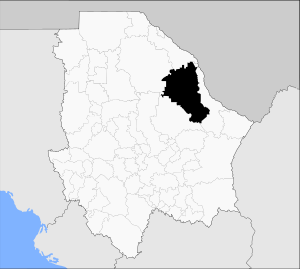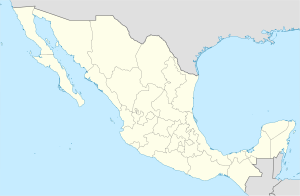Coyame facts for kids
Quick facts for kids
Santiago de Coyame
|
|
|---|---|
|
Town
|
|

Coyame is located in the Municipality of Coyame del Sotol
|
|
| Country | |
| State | Chihuahua |
| Municipality | Coyame del Sotol |
| Founded | 1715 |
| Elevation | 1,220 m (4,000 ft) |
| Population
(2010)
|
|
| • Total | 709 |
| Time zone | UTC−7 (Pacific (US Mountain)) |
| • Summer (DST) | UTC−6 (Pacific) |
| Postal code |
32850
|
| Area code(s) | 626 |
| Demonym | Coyamense |
Coyame, also known as Santiago de Coyame, is a small town in the Mexican state of Chihuahua. It is the main town, or municipal seat, of the Coyame del Sotol Municipality.
In 2010, a census counted 709 people living in Coyame. The town was founded a long time ago, in 1715, by a Spanish explorer named Juan Antonio Traviña y Retes. Coyame is also known for its natural features, including a hot spring and a system of caves.
Contents
Discovering Coyame: A Small Town in Mexico
Coyame is a quiet town with a rich history and interesting natural spots. It is located in the northern part of Mexico. This town plays an important role in its local area.
Where is Coyame Located?
Coyame is found in the large state of Chihuahua, Mexico. This state is known for its deserts and mountains. Coyame is the central town for the surrounding area, called the Coyame del Sotol Municipality.
A Look at Coyame's History
The town of Coyame has been around for a long time. It was officially started in the year 1715. A Spanish explorer named Juan Antonio Traviña y Retes was the person who founded it. This makes Coyame over 300 years old!
Exploring Nature's Wonders in Coyame
Coyame is not just a town; it's also a place where you can find cool natural attractions. One of these is a hot spring, where warm water comes up from underground. There is also a system of caves nearby. These caves are natural underground spaces that can be fun to explore.
Who Lives in Coyame?
According to a count taken in 2010, there were 709 people living in Coyame. This shows that it is a small community. The people who live in Coyame are sometimes called "Coyamense."
See also
 In Spanish: Coyame para niños
In Spanish: Coyame para niños
 | Bessie Coleman |
 | Spann Watson |
 | Jill E. Brown |
 | Sherman W. White |


